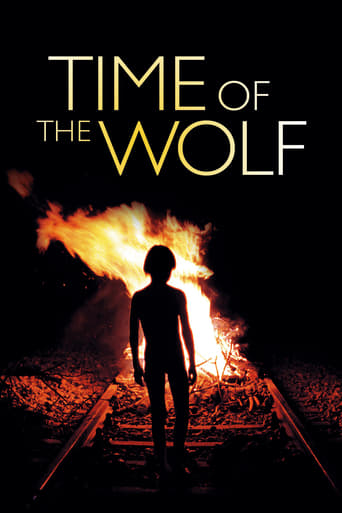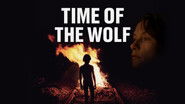orhan Akdeniz
Haneke's standard movie theme is here. What happens when the bourgeois class loses its safe life. It's a good movie, but I can say it's a weaker link than the director's other films. Before that I would recommend you to watch "LOVE" or "Funny Games".
Neddy Merrill
Comparisons of ?Time of the Wolf? to ?The Road? the movie based on the acclaimed book by Cormac McCarthy are inevitable. In both films an unnamed catastrophe has brought civilization to an end. However, given that ?Wolf? is mostly set in an French train station, the remaining level of civility post apocalypse is still superior to what you would encounter in Brooklyn on any given Tuesday. This does not mean Isabelle Huppert, who has been left a single mother of two after her husband is shot confronting squatters at their vacation home, is in for a good time. All manner of traps and hardships await as she tries to keep what is left of the family together on a road trip to a train station and during the time they wait with perhaps three dozen others for a train that may take them south where it is commonly believed some government body that can provide supplies. Her daughter hovers in the gap following childhood but before womanhood and the mix of rebellion and dependency is captured well by Beatrice Dalle. She pursues maturity in a crush on a thief played by Hakim Taleb but fears it after seeing firsthand what will happen to her once she crosses the line into sexual maturity in a freshly lawless France. Her brother Ben, played with the same starry-eyed shock as the unnamed boy in ?The Road? by Lucas Biscombe fairs far worse. He has gone mute with shock and is possibly a victim of the unspecified ground water contamination that is believed to be finishing off the livestock. Like the wife in ?The Road? the movie basically asks whether it is better to perish more quickly but far more easily in the conflagration that consumed society or to die horribly and slowly among its embers afterward. Also like ?The Road? the movie offers only the tiniest spark of hope with its final scene leaving the audience members to fill in the ending with their own sense of optimism or pessimism. ?Time of the Wolf? like the ?The Road? challenges the viewer to persevere through a painful drama without leavening of humor or even much humanity. What makes both of these so difficult is that someone will eventually live out these post-civilization nightmares whether it is a few hours or few millennia from now. The only hope is to get one?s lifetime in before that happens.
Jacob Miller-alderman
Many times, I will detract from a film for lacking a real ending or beginning, because it causes some incoherency in the story (not to mention it is sort of a let down), but when I sat down to watch "Time of the Wolf" I was fairly surprised on its ability to just pick up on a story and keep the momentum going without having to explain much at all.The name of the game here is subtlety, which is something Michael Haneke understands completely. His use of dialogue and atmosphere tells you whats going on without really saying outright: The world is ending. this is where the film really shines. There isn't much messing around either, strange happens are very apparent early on and seem to keep going until there very end.When I first heard it was apocalyptic setting, it crossed me as fairly peculiar. Michael Haneke's films, though being sort of surreal at moments, never really dip into the world of fantasy. I was really confused on how a man of his style was going to pull off a theme that was used primarily with big budgets and big special effects. Lo and behold, he pulls it off without a problem. The trick is as old as movies them selves; its not what we see, but what we don't that creates the story. We hear plenty from the different characters, but it is up to us to paint the picture in our head. A sort of practice that has been forgotten in the world of CGI.Speaking of characters, this film has plenty but don't spend time trying to get to know them. The only characters that you get to see develop is that of the main characters; a mother and her two kids. This lack of strong character structure creates a sort of realism to the film. I don't suspect myself to become acquainted to many folks during the apocalypse and for very good reason. As this movie shows, most of the people that will surround you in the end of days are either thieves, killers, or both and trust is not a luxury one can afford.Not Haneke's most gripping tale or most violent, but definitely one that deserves a good watch.
nazztrader
If you want to believe that you are a superior form of humanity, watch this film and then tell everyone you know that they must see it, that it will move them deeply, and that they will never be the same thereafter. When those who do watch it tell you how bored they were, act shocked and say, "oh my goodness, how is that possible?" This is a great example of what I'd call an "anti-film." Imagine going to a contemporary art gallery for a reception, and you are the first one to arrive. You come upon a construction that features a small catapult. As you get close to it, the catapult is set off, and a small pile of feces is flung in your face. Wasn't that great "art?" If you think so, this film is for you, no doubt. I enjoy dark, disturbing films, but it still must be a good film. To provide examples of my tastes, I'll cite "The Beloved," "A Clockwork Orange," "Dogville" and "Stalker," (though not nearly as good as these, I'd much rather watch "American Psycho" than TotW).Perhaps the idea was to create a didactic experience. Does this film teach us anything? Not if you've ever seen a documentary on Nazi atrocities. For me, there must be something intriguing. The characters can all be detestable, for instance, but then something else has to "step up." There could be humor ("black"), for example. In "The Rapture," there was a sociological element that was effective (though I'm not suggesting this film was excellent - again, at least it was a "film"!). I really like the idea of an "anti-horror film," actually. Rather than having "zombies" pop up every so often and chase the leading characters around, why not show the quiet desperation people feel when they know that there are forces about to destroy them, but they don't understand those forces, and don't know exactly how (or when) they will be destroyed (which could mean actual death or a psychological "meltdown").I was hoping this would be the case for the film "Blindness" (which I saw before this one), but instead experienced a bland, rather conventional construction that was not compelling on any level. However, at least "Blindness" was a film, and not an insult to the audience. As I was watching it, I could hope that it would develop into something interesting. When it was over, I could imagine a better ending that might have made it work. In contrast, "Time of the Wolf" has so many flaws that it is simply not worth the mental effort to consider in depth. As some of the ancient Greeks realized, a "work of art" requires a central focus. Otherwise, it is decorative ornament, at best. Basically, this is an anti-hero version of "The Omega Man." Again, this is a good idea, but it's essential to execute it well, instead of creating a snide, sophomoric, pointless mess.





